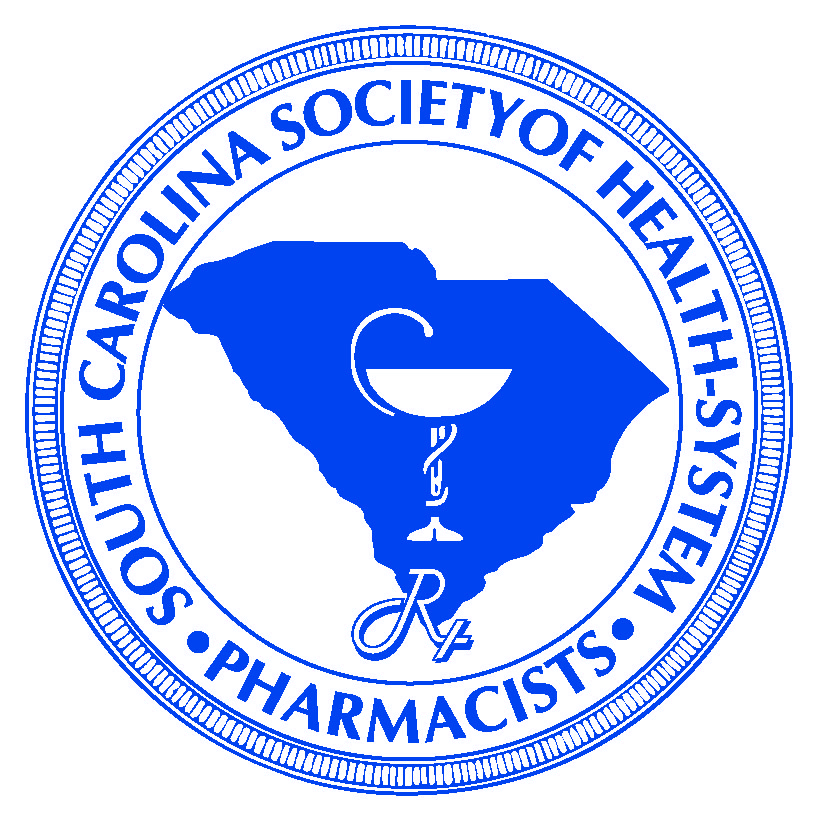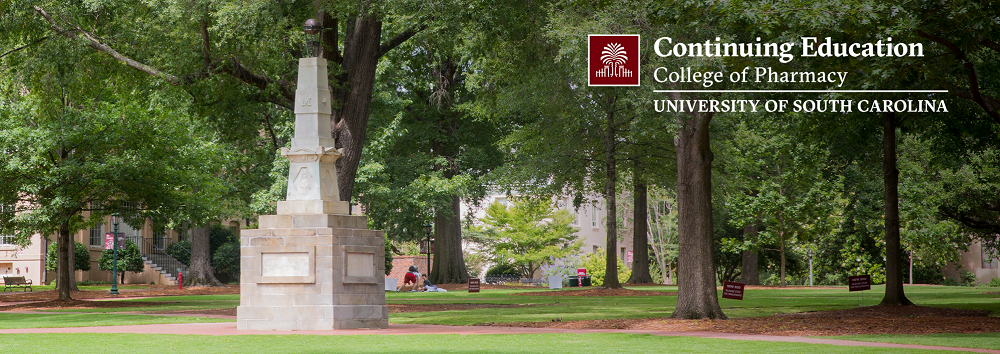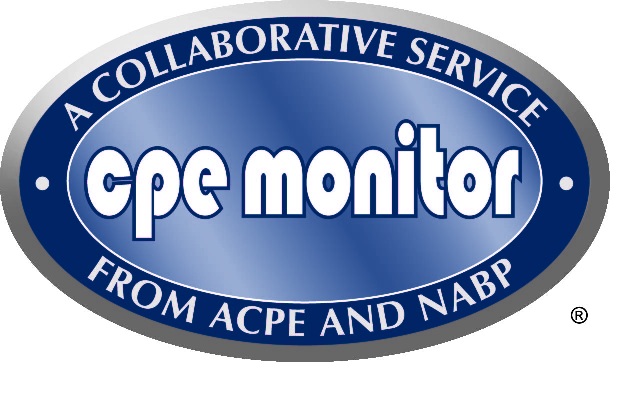
Date: Mar 12, 2020 08:00 AM - Mar 13, 2020 05:45 PM
Fee
CE Hours
CE Units
Activity Type
- Knowledge-Based and Application-Based
Target Audience(s)
- Pharmacists
Accreditation(s)

|
The University of South Carolina College of Pharmacy is accredited by the Accreditation Council for Pharmacy Education as a provider of continuing pharmacy education.
|
Co-Sponsor(s)
Requirements for CE Credit
- Check in upon arrival at the meeting
- Complete and submit the "CE Sign In" form at the meeting
- Complete the online program evaluations
- Provide the correct month and day of birth and NABP e-Profile ID. Registration with a proper disclosure of your NABP E-Profile ID is a requirement for receiving Continuing Pharmacy Education. To register with or look up your NABP e-Profile ID, please click on the CPE Monitor logo below to be directed to their site.
- Define burnout, well-being, and resilience
- Explain why clinician burnout is a patient care and healthcare workforce problem
- Discuss the U.S. National Academy of Medicine Clinician Well-Being and Resilience Action Collaborative and consensus study
- Identify strategies to improve well-being and resilience in the healthcare workforce
Speaker(s)/Author(s)
|
Paul W. Abramowitz, Pharm.D., Sc.D. (Hon), FASHP
|
Activity Number
0062-9999-20-084-L04-PCE Hours
- Recognize that diversity promotes healthier leadership and decision-making
- Define implicit biases and their pervasiveness
- Examine the impact of mitigating implicit bias on decisions in healthcare and education
Speaker(s)/Author(s)
|
B. DaNine Fleming, EdS, EdD
|
Activity Number
0062-9999-20-085-L04-PCE Hours
- Apply updated infectious diseases treatment guidelines and policies to antimicrobial recommendations
- Analyze clinical implications of peer-reviewed infectious diseases literature
- Determine the role of newly approved antimicrobials
- Acknowledge emerging pathogens both nationally and globally
- Discuss changes in roles and responsibilities of pharmacists in managing infectious diseases
Speaker(s)/Author(s)
|
P. Brandon Bookstaver, PharmD, FCCP, BCIDP
|
Activity Number
0062-9999-20-086-L01-PCE Hours
- Identify patients who would be appropriate candidates for high-dose intravenous thiamine replacement
- Recognize when a short-course corticosteroid regimen may require a taper
- Explain the unreliability of subgroup analyses
Speaker(s)/Author(s)
|
Kathryn Rice, PharmD, BCPS
|
Activity Number
0062-9999-20-087-L01-PCE Hours
- Explain the mechanism of action for sodium glucose co-transporter 2 (SGLT-2) inhibitors
- Critically evaluate the published literature regarding SGLT-2 inhibitors on heart failure (HF) outcomes
- Formulate a treatment regimen with a SGLT-2 inhibitor for a patient with type 2 diabetes mellitus (T2DM) and HF
Speaker(s)/Author(s)
|
Jennifer Clements, PharmD, FCCP, FADCES, BCPS, CDCES, BCACP, BC-ADM
|
Activity Number
0062-9999-20-088-L01-PCE Hours
- Recall pharmacy trivia related to pharmacology, pharmacokinetics, pharmacodynamics, pharmacogenomics, clinical pharmacy history, biostatistics, and health outcomes
- Summarize clinical knowledge in response to a case vignette using supporting laboratory, physical examination, and medical history information
- Discuss numerous drug therapy and specialty areas through response to pharmacotherapy questions
Speaker(s)/Author(s)
|
P. Brandon Bookstaver, PharmD, FCCP, BCIDP
|
Activity Number
0062-9999-20-089-L01-PCE Hours
- Effect of pharmacist-led educational interventions on proton pump inhibitor de-prescribing in an inpatient psychiatric facility – Anju Balani, PharmD Candidate, Presbyterian College School of Pharmacy
- Cyclin-dependent kinase 8/19 inhibitors suppress the metastatic growth of secondary tumor cells ex vivo – Stephan Bowe, PharmD Candidate, USC College of Pharmacy
- Comparative Monte Carlo analysis of cefepime/VNRX-5133 and meropenem/vaborbactam against resistant Gram-negative pathogens – Meghan White, PharmD Candidate, MUSC College of Pharmacy
- Discuss emerging research outcomes from throughout the state of South Carolina
- Recognize novel ideas for research and quality initiative projects in your pharmacy practice areas
- Review pivotal results from local investigations across the state of South Carolina
Activity Number
0062-9999-20-090-L04-PCE Hours
- Recall pharmacy trivia related to pharmacology, pharmacokinetics, pharmacodynamics, pharmacogenomics, clinical pharmacy history, biostatistics, and health outcomes
- Summarize clinical knowledge in response to a case vignette using supporting laboratory, physical examination, and medical history information
- Discuss numerous drug therapy and specialty areas through response to pharmacotherapy questions
Speaker(s)/Author(s)
|
P. Brandon Bookstaver, PharmD, FCCP, BCIDP
|
Activity Number
0062-9999-20-091-L01-PCE Hours
- Review the history of opioid use and the impact of the current opioid epidemic in the U.S.
- Discuss pain management strategies that health care practitioners can use in light of the opioid epidemic
- Review the path to opioid use disorder (OUD) and key preventative strategies that everyone can employ to reduce the risk of opioid overdose
Speaker(s)/Author(s)
|
Doug Furmanek, PharmD, BCCP
|
Activity Number
0062-9999-20-095-L08-PCE Hours
- Evaluate the role of newer, carbapenem-sparing agents for the treatment of resistant Gram-negative bloodstream infections (BSI)
- Identify and assess candidates for shorter durations of therapy for BSIs
- Evaluate and apply recent literature for oral antibiotics in BSIs
Speaker(s)/Author(s)
|
Krutika N. Mediwala, PharmD, BCPS, BCIDP
|
Activity Number
0062-9999-20-096-L01-PCE Hours
- Demonstrate knowledge of Advanced Cardiac Life Support (ACLS) algorithms per the American Heart Association (AHA) guidelines
- Discuss the evidence behind interventions in cardiac arrest and determine which interventions are most likely to positively impact patient outcomes
- Describe the possible future of cardiac arrest care based on emerging evidence
Speaker(s)/Author(s)
|
Elizabeth Robinette, PharmD, BCCCP
|
Activity Number
0062-9999-20-097-L01-PCE Hours
- Describe the mechanisms of action for ascorbic acid, thiamine, and angiotensin II for the treatment of septic shock
- List the possible pros and cons of using ascorbic acid, thiamine, and angiotensin II for a patient with septic shock
- Design appropriate monitoring parameters when prescribed ascorbic acid, thiamine, and angiotensin II, given a patient in septic shock
Speaker(s)/Author(s)
|
Carolyn A. Magee, PharmD, BCCCP
|
Activity Number
0062-9999-20-098-L01-PCE Hours
- Determine the appropriate duration of therapy for community-acquired pneumonia (CAP)?
- Summarize the evidence regarding duration of therapy for CAP
- Define gestational hypertension, preeclampsia and HELLP
- Identify the most common risk factors for preeclampsia
- Review current guidelines and literature for the utilization of the MRSA-PCR nasal swab
- Identify appropriate non-respiratory related illnesses in which MRSA-PCR nasal swab can be utilized to guide antibiotic therapy
Speaker(s)/Author(s)
|
Jasmine E. Manning, MPH, PharmD
|
|
|
Rebecca Howell, PharmD, RN
|
|
|
Robin Fischer, PharmD
|
Activity Number
0062-9999-20-099-L01-PCE Hours
- Recommend low-dose insulin regimens for high-risk patients with hyperkalemia
- Evaluate the potential role of potassium binders in the emergent treatment of hyperkalemia
- Identify the current available preventative migraine treatment options
- Evaluate the literature available for erenumab to determine its place in therapy
- Determine the appropriate utilization of continuous glucose monitoring in diabetes care.
- Discuss thromboelastography (TEG) use and the interpretation of results in the setting of hemorrhage
Speaker(s)/Author(s)
|
Hannah Green, PharmD
|
|
|
Kennedy Gambill, PharmD
|
|
|
Melanie Routhieaux, PharmD, BCPS
|
|
|
Reaghan Erickson, PharmD
|
Activity Number
0062-9999-20-100-L01-PCE Hours
- Identify drug information topics and resources taught in didactic pharmacy curricula
- Recognize common learning theories
- Discover methodologies utilized on a successful rotation
- Utilize available tools to maintain a current pharmacy knowledge base
Speaker(s)/Author(s)
|
Christopher S. Wisniewski, PharmD, MSCR, BCPS
|

